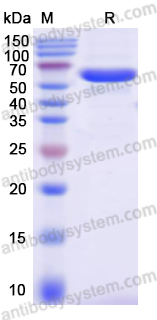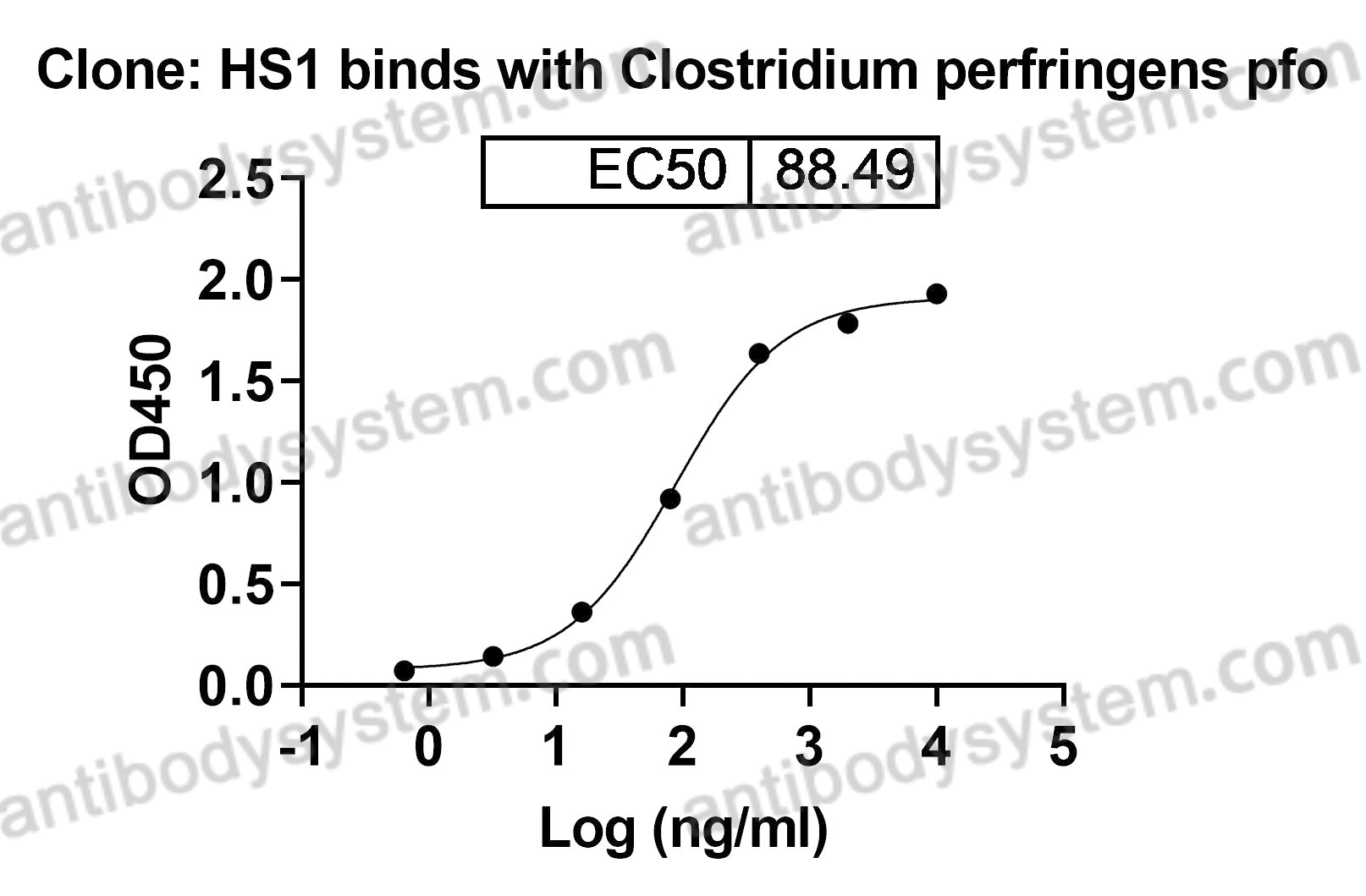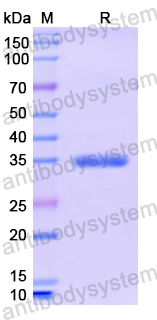Catalog No.
YXX01301
Expression system
E. coli
Species
Clostridium perfringens (strain 13 / Type A)
Protein length
Asp30-Asn500
Predicted molecular weight
54.87 kDa
Nature
Recombinant
Endotoxin level
Please contact with the lab for this information.
Purity
>90% as determined by SDS-PAGE.
Accession
P0C2E9
Applications
ELISA, Immunogen, SDS-PAGE, WB, Bioactivity testing in progress
Form
Lyophilized
Storage buffer
Lyophilized from a solution in PBS pH 7.4, 0.02% NLS, 1mM EDTA, 4% Trehalose, 1% Mannitol.
Reconstitution
Reconstitute in sterile water for a stock solution. A copy of datasheet will be provided with the products, please refer to it for details.
Shipping
In general, proteins are provided as lyophilized powder/frozen liquid. They are shipped out with dry ice/blue ice unless customers require otherwise.
Stability and Storage
Use a manual defrost freezer and avoid repeated freeze thaw cycles. Store at 2 to 8°C for frequent use. Store at -20 to -80°C for twelve months from the date of receipt.
Alternative Names
Perfringolysin O, PFO, Theta-toxin, Thiol-activated cytolysin, pfo, pfoA, pfoR, CPE0163
BrnQ Branched-Chain Amino Acid Transporters Influence Toxin Production by, but Not Growth of, Clostridium perfringens Type A Strain ATCC3624., PMID:40278685
Hexameric-Based Hierarchy in the Sizes of a Cytolysin Pore-Forming Complex., PMID:40149960
Use of the D4H Probe to Track Sterols in Yeast., PMID:39699723
The presence of differentiated C2C12 muscle cells enhances toxin production and growth by Clostridium perfringens type A strain ATCC3624., PMID:39192628
The Barrier Disruption and Pyroptosis of Intestinal Epithelial Cells Caused by Perfringolysin O (PFO) from Clostridium perfringens., PMID:38994991
Toxigenic Clostridium perfringens Isolated from At-Risk Paediatric Inflammatory Bowel Disease Patients., PMID:38267224
Repurposing rabeprazole sodium as an anti-Clostridium perfringens drug by inhibiting perfringolysin O., PMID:38017630
Piceatannol Alleviates Clostridium perfringens Virulence by Inhibiting Perfringolysin O., PMID:36014383
Single-molecule analysis of the entire perfringolysin O pore formation pathway., PMID:36000711
Single-molecule tracking of perfringolysin O assembly and membrane insertion uncoupling., PMID:35989549
Ultrasensitive Label-Free Detection of Protein-Membrane Interaction Exemplified by Toxin-Liposome Insertion., PMID:35377651
Immunogenic and neutralization efficacy of recombinant perfringolysin O of Clostridium perfringens and its C-terminal receptor-binding domain in a murine model., PMID:35032316
GST-Perfringolysin O production for the localization and quantification of membrane cholesterol in human and mouse brain and liver., PMID:35024626
Preparation and utility of asymmetric lipid vesicles for studies of perfringolysin O-lipid interactions., PMID:33712189
An anti-perfringolysin O monoclonal antibody cross-reactive with streptolysin O protects against streptococcal toxic shock syndrome., PMID:32891180
Inflammasome Activation Induced by Perfringolysin O of Clostridium perfringens and Its Involvement in the Progression of Gas Gangrene., PMID:31708887
Ostreolysin A and anthrolysin O use different mechanisms to control movement of cholesterol from the plasma membrane to the endoplasmic reticulum., PMID:31597703
Perfringolysin O-Induced Plasma Membrane Pores Trigger Actomyosin Remodeling and Endoplasmic Reticulum Redistribution., PMID:31319618
An Intermolecular π-Stacking Interaction Drives Conformational Changes Necessary to β-Barrel Formation in a Pore-Forming Toxin., PMID:31266869
Pleiotropic Clostridioides difficile Cyclophilin PpiB Controls Cysteine-Tolerance, Toxin Production, the Central Metabolism and Multiple Stress Responses., PMID:31024308
The Structural Basis for a Transition State That Regulates Pore Formation in a Bacterial Toxin., PMID:31015325
Changes in the asymmetric distribution of cholesterol in the plasma membrane influence streptolysin O pore formation., PMID:30872611
Multiple Parameters Beyond Lipid Binding Affinity Drive Cytotoxicity of Cholesterol-Dependent Cytolysins., PMID:30577571
Fine-tuning of the stability of β-strands by Y181 in perfringolysin O directs the prepore to pore transition., PMID:30463694
Interaction of Cholesterol with Perfringolysin O: What Have We Learned from Functional Analysis?, PMID:29168745
Mechanistic Insights into the Cholesterol-dependent Binding of Perfringolysin O-based Probes and Cell Membranes., PMID:29061991
R468A mutation in perfringolysin O destabilizes toxin structure and induces membrane fusion., PMID:28263714
High-resolution imaging and quantification of plasma membrane cholesterol by NanoSIMS., PMID:28167768
Non-toxic perfringolysin O and α-toxin derivatives as potential vaccine candidates against bovine necrohaemorrhagic enteritis., PMID:27810219
Perfringolysin O Theta Toxin as a Tool to Monitor the Distribution and Inhomogeneity of Cholesterol in Cellular Membranes., PMID:27005662
Single molecule compression reveals intra-protein forces drive cytotoxin pore formation., PMID:26652734
The Cholesterol-dependent Cytolysin Membrane-binding Interface Discriminates Lipid Environments of Cholesterol to Support β-Barrel Pore Insertion., PMID:26032415
Perfringolysin O: The Underrated Clostridium perfringens Toxin?, PMID:26008232
Antibody-mediated neutralization of perfringolysin o for intracellular protein delivery., PMID:25881713
Decreasing Transmembrane Segment Length Greatly Decreases Perfringolysin O Pore Size., PMID:25850715
Crucial role of perfringolysin O D1 domain in orchestrating structural transitions leading to membrane-perforating pores: a hydrogen-deuterium exchange study., PMID:25164812
Detection of esterified cholesterol in murine Bruch's membrane wholemounts with a perfringolysin O-based cholesterol marker., PMID:24985479
Three pools of plasma membrane cholesterol and their relation to cholesterol homeostasis., PMID:24920391
Perfringolysin O structure and mechanism of pore formation as a paradigm for cholesterol-dependent cytolysins., PMID:24798008
Visualization of cholesterol deposits in lysosomes of Niemann-Pick type C fibroblasts using recombinant perfringolysin O., PMID:24775609
Side-chain oxysterols modulate cholesterol accessibility through membrane remodeling., PMID:24758724
The influence of natural lipid asymmetry upon the conformation of a membrane-inserted protein (perfringolysin O)., PMID:24398685
Transmembrane protein (perfringolysin o) association with ordered membrane domains (rafts) depends upon the raft-associating properties of protein-bound sterol., PMID:24359745
Structural studies of Streptococcus pyogenes streptolysin O provide insights into the early steps of membrane penetration., PMID:24316049
Membrane pore formation by human complement: functional importance of the transmembrane β-hairpin (TMH) segments of C8α and C9., PMID:24239861
Use of mutant 125I-perfringolysin O to probe transport and organization of cholesterol in membranes of animal cells., PMID:23754385
Disulfide-bond scanning reveals assembly state and β-strand tilt angle of the PFO β-barrel., PMID:23563525
Catch-and-release probes applied to semi-intact cells reveal ubiquitin-specific protease expression in Chlamydia trachomatis infection., PMID:23335262
Nonclinical Development of BCG Replacement Vaccine Candidates., PMID:26343962
Altering hydrophobic sequence lengths shows that hydrophobic mismatch controls affinity for ordered lipid domains (rafts) in the multitransmembrane strand protein perfringolysin O., PMID:23150664



